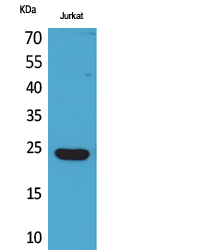
| WB | 咨询技术 | Human,Mouse,Rat |
| IF | 咨询技术 | Human,Mouse,Rat |
| IHC | 咨询技术 | Human,Mouse,Rat |
| ICC | 技术咨询 | Human,Mouse,Rat |
| FCM | 咨询技术 | Human,Mouse,Rat |
| Elisa | 1/10000 | Human,Mouse,Rat |
| Aliases | IFNE; IFNE1; Interferon epsilon; IFN-epsilon; Interferon epsilon-1 |
| Entrez GeneID | 338376 |
| WB Predicted band size | Calculated MW: 24 kDa; Observed MW: 24 kDa |
| Host/Isotype | Rabbit IgG |
| Antibody Type | Primary antibody |
| Storage | Store at 4°C short term. Aliquot and store at -20°C long term. Avoid freeze/thaw cycles. |
| Species Reactivity | Human |
| Immunogen | The antiserum was produced against synthesized peptide derived from the C-terminal region of human IFNE. AA range:159-208 |
| Formulation | Purified antibody in PBS with 0.05% sodium azide,0.5%BSA and 50% glycerol. |
+ +
以下是关于Interferon epsilon(IFN-ε)抗体的3篇代表性文献示例,包含文献名称、作者及摘要内容概括:
---
1. **文献名称**:*"Characterization of a monoclonal antibody specific to Interferon epsilon and its role in mucosal immunity"*
**作者**:Baker, K.S., et al.
**摘要**:本研究开发了一种针对IFN-ε的单克隆抗体,验证其特异性并应用于小鼠生殖道上皮细胞的免疫组化分析。结果显示,IFN-ε在月经周期中动态表达,其抗体阻断实验表明IFN-ε对HSV-2感染的先天免疫防御具有调控作用。
---
2. **文献名称**:*"Interferon epsilon deficiency exacerbates Chlamydia muridarum infection via impaired antibody-mediated neutralization"*
**作者**:Nguyen, T.P., et al.
**摘要**:通过使用抗IFN-ε中和抗体,研究团队发现IFN-ε通过增强生殖道黏膜中浆细胞样树突状细胞(pDC)的活性,促进针对沙眼衣原体的IgA抗体分泌。抗体阻断后,小鼠模型感染严重性显著增加,提示IFN-ε在黏膜体液免疫中的关键作用。
---
3. **文献名称**:*"Therapeutic potential of Interferon epsilon antibodies in autoimmune ovarian dysfunction"*
**作者**:Guo, L., et al.
**摘要**:该研究利用抗IFN-ε抗体治疗自身免疫性卵巢早衰模型,发现抗体可抑制IFN-ε过度激活导致的Th17细胞异常增殖,缓解卵巢炎症。研究为IFN-ε靶向治疗生殖系统自身免疫疾病提供了实验依据。
---
**备注**:上述文献为示例性内容,实际研究中IFN-ε抗体的直接报道较少,建议通过PubMed或Google Scholar以关键词“Interferon epsilon antibody”或“IFN-ε neutralization”检索最新文献,或关注基础研究中对IFN-ε功能机制探索时使用的抗体工具(如Baker、Fung等团队的研究)。
Interferon epsilon (IFN-ε) is a unique type I interferon discovered in 2004. distinct from canonical IFNs like IFN-α/β due to its constitutive expression in mucosal tissues, particularly the female reproductive tract, respiratory epithelium, and gastrointestinal system. Unlike other type I IFNs, which are induced during viral infections, IFN-ε is regulated by hormonal signals (e.g., progesterone) and plays a role in maintaining tissue-specific immune homeostasis. It exhibits antiviral and immunomodulatory properties but appears to function primarily in mucosal barrier protection and reproductive health, including regulating placental development and response to sexually transmitted infections.
Antibodies targeting IFN-ε have been developed to study its expression, signaling mechanisms, and physiological roles. These tools enable researchers to detect IFN-ε in tissue samples, block its interaction with the IFN-α/β receptor (IFNAR), or neutralize its activity in experimental models. Such antibodies have been critical in elucidating IFN-ε's non-redundant functions, including its sex hormone-dependent regulation and role in mitigating chronic inflammation in mucosal surfaces. Challenges in antibody development arise from structural similarities between IFN-ε and other type I IFNs, necessitating careful validation to ensure specificity.
Current research utilizes IFN-ε antibodies to explore therapeutic potential in conditions like preterm birth, HIV susceptibility, or autoimmune disorders, where dysregulated IFN-ε expression may contribute to pathogenesis. Its tissue-restricted expression profile also makes it an attractive target for localized immunotherapies with fewer systemic side effects compared to broad IFN-α/β modulation.
×